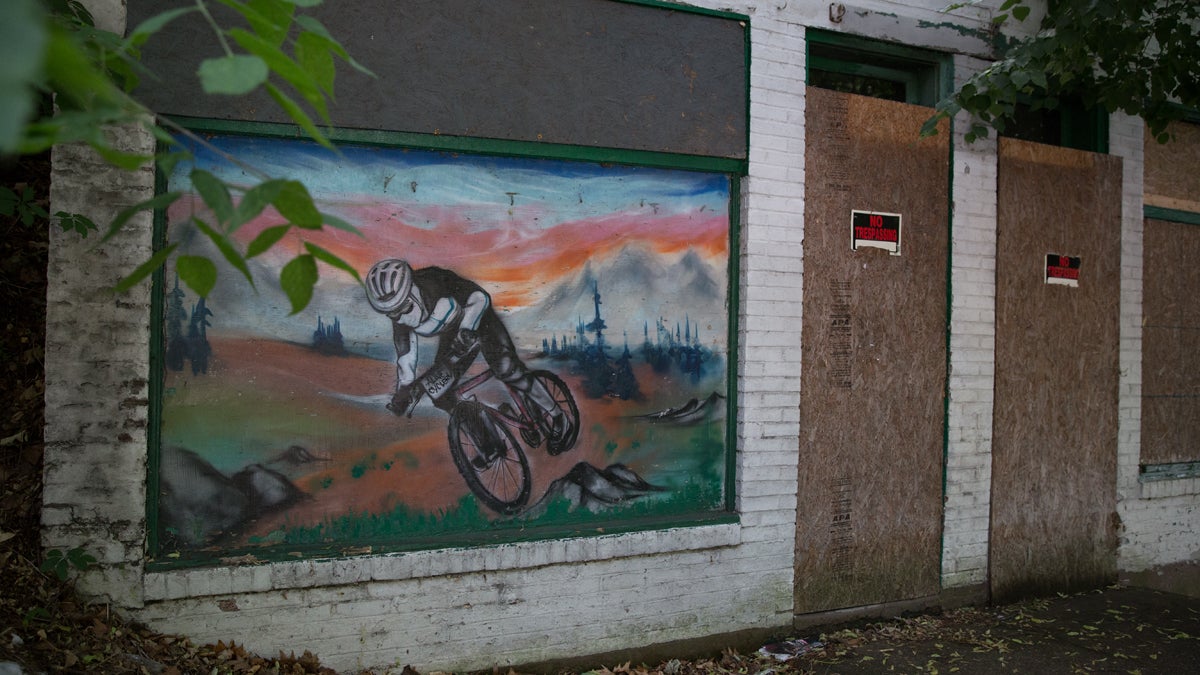Capitol recap: What’s happening in Harrisburg beyond the budget that could affect Pa. cities?

Artwork covering one window of a blighted building on Market Street in Harrisburg, Pa. (Lindsay Lazarski/WHYY)
State lawmakers have moved some blight and revitalization bills, although pensions and the Commonwealth’s next fiscal plan dominate discussions in Harrisburg.
One piece of legislation signed Friday by Gov. Wolf aims to make it easier to initiate prosecution against owners of blighted properties. Right now, code violations on blighted properties don’t count as crimes until a city’s issued four citations and obtained convictions. But that almost never happens due to other loopholes in state law that complicate prosecuting a municipality’s “neighborhood terrorists,” as Harrisburg’s long-time code administrator Dave Patton has called them. Act 34 cuts the criminal charge prerequisite citations in half, so that the second conviction is a second-degree misdemeanor and the third’s a first-degree misdemeanor, according to a memo from bill sponsor Kim Ward, R-Westmoreland.
That means a faster route to higher fines and potential harsher penalties, including probation and jail time.
But Patton, who’s regarded as a municipal code expert statewide, says the bill probably won’t completely stop people from avoiding prosecution because it doesn’t address what he thinks is the crux of the problem: property flipping.
Basically, property flipping is when owners sell properties cheaply and quickly. Often, the new owner is a relative or friend — or the same owner, disguised as a limited liability corporation. Once the owner changes, the citation and prosecution process starts again. The new rules might require more effort from evasive owners, but won’t outright prevent it, Patton says.
“We’ve seen properties flipping three times in one day,” Patton says. “We have to reissue new condemnation orders to the new owners and before the ink is dry they’re sold again. …. We now have an owner in Australia and Indonesia as well as many states. Fines levied against these folks will not yield success.”
Patton says better filing requirements for corporations in Pennsylvania could go a long way toward fixing the problem, but that his past lobbying efforts failed to get state laws changed.
Pennsylvania corporate registration rules don’t require all types of companies to provide names and contact information for their officers, for example. So if Company X owns a blighted property, but its state registration doesn’t have updated – or any – contact information for the people running it, officials like Patton can’t easily identify the responsible party.
Other recent blight bills — such as one from last year adding a surcharge to fund rehab grants and another introduced Thursday cutting time given to new owners to fix problems — also haven’t addressed these loopholes.
Indeed, getting those responsible for blight to pay to fix it often proves impossible. Some of the Commonwealth’s programs to deal with that reality would be expanded by a few other proposals.
Bills reintroduced last week by state Sen. Pat Browne, R-Lehigh, targets tax-increment financing (TIF) districts. The set of bills started as one introduced the last two sessions.
TIF districts are designated by the state in blighted or polluted areas as a way of incentivizing development that might otherwise be cost-prohibitive. After the district’s established, any additional real estate taxes stemming from new development or improved properties therein go toward repaying loans taken for infrastructure projects.
To be clear: only the extra revenue goes toward debt service. Municipalities and school districts continue to collect the same as they did prior to the designation.
Browne’s not suggesting changing any of that, but adding state and local sales and income taxes to the mix. Doing so would make TIF districts more like a City Revitalization and Improvement Zone (CRIZ). A CRIZ uses additional sales, income and property taxes generated after a designation to pay off debt taken to finance infrastructure improvements. TIF districts would still apply only to blighted and polluted areas, which the CRIZ program doesn’t specify.
Browne’s proposals also leave TIF districts open to any municipality, versus CRIZ’s exclusivity to third-class cities (with limitations for any that DCED has determined to be distressed or in need of a receivership). Other legislators want to change the CRIZ program requirements so that more municipalities qualify. A bill from state Sen. David Argall, R-Berks, would open up the program to any municipality: townships, boroughs and cities, regardless of population.
But Argall’s legislation excludes any municipality that ever had a receiver — at this point, that’s just the city of Harrisburg. State Rep. Patty Kim, a Democrat who represents the capital city, introduced bills last session and again Thursday seeking to let cities go for a CRIZ after DCED removes the receiver.
Introduced last week, Browne and Argall’s bills are with the Senate Finance Committee, which hasn’t posted its next meeting.
Editor’s note: This story has been updated to reflect Gov. Wolf signing SB330/Act 34.
WHYY is your source for fact-based, in-depth journalism and information. As a nonprofit organization, we rely on financial support from readers like you. Please give today.



